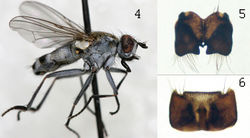Lispe ethiopica
| Notice: | This page is derived from the original publication listed below, whose author(s) should always be credited. Further contributors may edit and improve the content of this page and, consequently, need to be credited as well (see page history). Any assessment of factual correctness requires a careful review of the original article as well as of subsequent contributions.
If you are uncertain whether your planned contribution is correct or not, we suggest that you use the associated discussion page instead of editing the page directly. This page should be cited as follows (rationale):
Citation formats to copy and paste
BibTeX: @article{Vikhrev2012ZooKeys235, RIS/ Endnote: TY - JOUR Wikipedia/ Citizendium: <ref name="Vikhrev2012ZooKeys235">{{Citation See also the citation download page at the journal. |
Ordo: Diptera
Familia: Muscidae
Genus: Lispe
Name
Lispe ethiopica Vikhrev sp. n. – Wikispecies link – ZooBank link – Pensoft Profile
Holotype:
male, Ethiopia, Oromia, Langano Lake, 1590m asl, 7.646°N, 38.706°E, 13-15.III.2012, NV (ZMUM).
Paratypes 23♂♂, 24♀♀. Ethiopia: Dire Dawa, Afrika, Diredaua [= Ethiopia, Dire Dawa, 9.60°N, 41.85°E], 28.X.[1945–55], O.Theodor, 1♂(TAUI); Oromia: Mojo bridge, 8.597°N, 39.111°E, 21.IX.2003, A.Freidberg, 1♂ (TAUI); Langano Lake, 1590m asl, 7.646°N, 38.706°E, 13–15.III.2012, NV, 9♂♂, 12♀♀; Ziway Lake, 1640m asl, 7.91°N, 38.73°E, 11–13.III.2012, NV, 11♂♂, 12♀♀; Abijata Lake, 1580m asl, 7.61°N, 38.65°E, 14.III.2012, NV, 1♂.
Description
Male, body length 6.5–7.5 mm.
Head. Frontal triangle remarkably narrow, brownish in posterior half, yellowish-grey dusted in anterior half. Interfrontalia blackish-brown. Fronto-orbital plate blakish-brown in posterior third, yellowish-grey dusted anteriorly; with 3-5 inclinate and 2 proclinate setae and dense hairs in outer row. Parafacial and cheek whitish dusted, occiput grey, parafacial with a row of hairs. Antenna black, postpedicel short, only 2 times longer than pedicel. Arista with hairs half as long as antenna width. Vibrissae medium strong. Palpi blackish.
Thorax. Pleura densely grey dusted, scutellum and disc of scutum brown, thinly dusted, with a pair of densely dusted prescutellar ochrous spots; vittae indistinct. Presutural ac in 4 irregular rows; dc 2+4, four anterior pair medium strong, two posterior pairs strong; intraalars 1+2; supraalars 1+2; katepisternals 1+2; anepimeron with 11-13 setulae; meron with 3-5 setulae above hind coxa. Wings hyaline, slightly brownish, vein Mdistinctly curved forward at apex, calypters white, halter yellow.
Legs black with grey dusting, but knees and base of tibiae yellowish. f1 with a row of pd setae and a row of pv setulae; t1 with submedian p seta. f2 with a seta at middle and 2 pd preapicals; t2 with p seta at middle and av seta in apical third; mid tarsus simple. f3 with 1-2 fine v setulae at base, at apex with 1 short av and 1 short pv; t3 with submedian ad and pd setae and with long fine av at apical third, setulae in the ad row elongated. Hind tarsus modified: tar3-1 dorso-ventrally flattened, distinctly wider than width of t3, on av surface with a dense row of fine curled setulae.
Abdomen with dense whitish dusting; tergites 3 to 5 with a pair of large black fused spots each. Cercal plate and sternite 5 as in Figs 5 and 6.
Female differs from male as follows: body length 7-8 mm; t3 with av seta strong; hind tarsus simple.
Diagnosis
Lispe ethiopica sp.n. is related to Lispe cilitarsis Loew, 1856 and probably was overlooked due to that resemblance. These two species may be reliably distinguished in both sexes as recommended in the identification key above.
Etymology. Named after the locality of the type series.
Original Description
- Vikhrev, N; 2012: Revision of the Lispe longicollis-group (Diptera, Muscidae) ZooKeys, 235: 23-39. doi
Images
|
